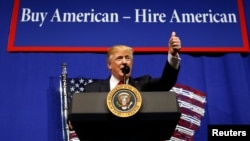Applications for H1-B visas are down slightly this year amid uncertainty in the U.S. about the program and talk of reform.
The U.S. Citizenship and Immigration Services (USCIS) reports that 199,000 H1-B applications were made during the week-long filing period that began April 3. Two years ago 233,000 applications were made during the same April period.
H1-Bs allow employers — mostly high-tech firms — to hire skilled foreign workers to work in the U.S. for three years. There are 85,000 slots available each year, 65,000 for applicants with bachelor's degrees and 20,000 for those with master's degrees or higher.
USCIS says it has already conducted a computer-generated random lottery to determine which of the applications will be accepted.
The H1-B program has come under criticism for taking American jobs and driving down wages.
Tuesday, President Donald Trump signed an executive order aimed at making it harder for companies to hire foreign workers under the H1-B program.
"We are going to use a tool you all know very well. It's called the sledgehammer," Trump said Tuesday during a speech at Snap-on Tools, a company in Kenosha, Wisconsin.
In the order, called “"Buy American — Hire American," the president directed four government agencies to “suggest reforms” to the H1-B visa program “as soon as practicable.”
"They [H1-Bs] should be given to the most skilled and highest-paid applicants and not be used to replace Americans," Trump said.
The Secretary of State, the Attorney General, the Secretary of Labor, and the Secretary of Homeland Security also shall “propose new rules and issue new guidance, to supersede or revise previous rules and guidance if appropriate, to protect the interests of United States workers in the administration of our immigration system, including through the prevention of fraud or abuse,” the president directed.
WATCH: What is an H1-B Visa?
Fixing H1-Bs
Howard University political science professor Ron Hira said the Trump administration is right: "The laws are loose, and so what happens is it's become a way for employers to bring in cheaper, indentured workers as opposed to filling those skills gaps. As a result, the program is oversubscribed, and it's actually undercutting Americans."
Hira added that the intent of the program is good in serving as a guest worker program for when there are shortages of American workers. What got in the way? Politics.
Companies are making so much money, he said, that they are able to influence Congress to prevent changes in the H1-B program. And it's all legal.
Hira said that if the sledgehammer seemed to be velvet-coated, that's because the executive order is not really intended to change policy so much as to guide policy changes. It will take time for federal agencies to study the program and implement changes – a likely relief to companies who feared the program might have been dismantled.
"The idea behind the executive order is to make it merit-based, that the really highly skilled people get preference over the cheap labor that goes on," Hira said.
Overwhelmingly, India has been the biggest recipient of H1-B visas. The Department of Homeland Security reports that 71 percent of H1-Bs went to Indians in 2015. China was a distant second with 10 percent of the visas.
India's success is attributed to its huge outsourcing firms that submit thousands of applications every year, increasing their chances of winning the visa lottery.
Outsourcing firms, which supply services to other companies, are controversial because they are not subject to a federal requirement that they not displace American workers if they pay the H1-Bs at least $60,000 a year.
Hira said the new policy might help high-tech American companies at the expense of the outsourcing firms that abuse the system. But "expect the Indian government to lobby against the changes," he predicted.
VOA's Mil Arcega contributed to this report.






